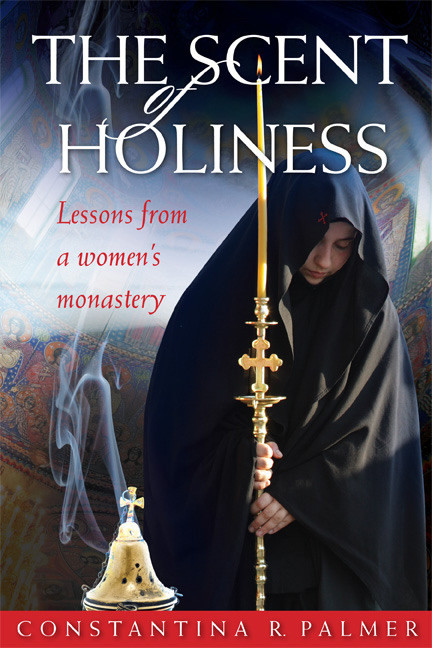The Scent of Holiness, Lessons From a Women’s Monastery - By Constantina R. Palmer

Pani Eleni, my good friend (and new neighbor), is a supporter of my book-reading ambitions and offered me a book from her shelf. The Scent of Holiness, Lessons From a Women’s Monastery by Constantina R. Palmer is a book of short anecdotes of the author’s experiences at women’s monasteries in Greece. I have to admit that among my recent readings there is no shortage of monastic themes, but this book brought a welcomed reprieve from the seriousness so often found in writings about monastic life and struggle.
The author is a convert to Orthodoxy and a native of Canada, so her experiences in Greek women’s monasteries are often colored with the challenges of communicating in a different language and culture. This often results in humorous encounters (like that time when she tries to explain the sport of curling). The book contains miracle stories, advice from holy mothers and spiritual fathers, descriptions of the monastic lifestyle and practical ways to change our thoughts to avoid temptations. Her experiences are a beautiful reminder that God’s Grace is abundant for those ready to greet Him.
I choose to share the following excerpt about Great-Schema Nun Markella because it illustrates humility within a community, something that we, within church communities, workplaces and families, must also work towards.
The first few times I met her, I was blown away by her joy. She had so many health problems; the nuns had to take complete care of her. She was no longer able to walk, or even to stand. She had not had full use of her right arms since she was twelve years old.
Yet she always greeted you with a smile and would tell you to come close so she could kiss you on your cheeks. You would bend low each time and snatch a kiss from her hand—a blessing—knowing the kiss to be secured, since she can’t pull he hand back from you.
She would ask you to sit with her to “make company” and, if you knew her well, she would tell you some of the spiritual things she experiences.
You would listen in amazement, all the while knowing that she has no idea that she is betraying her spiritual height. Out of perfect humility and natural simplicity, she never thought for a moment that the things she tells you reveal, not only the miraculous ways of God, but her own worthiness of the gifts.
She may even ask you to get a tissue out of her pocket to clean her glasses or walk across the room to get her some water and then tell you how exactly she would like the water thermos placed on the shelf. You would see that she does all of this without a shade of shame; she is not embarrassed that she requires help and does not hesitate to ask for it. She accepts her trials in the true spirit of humility. She does not have the egotism that is present in us who cannot accept help from others; we who are ashamed to ask for help, or accept it when it is offered.
It seems to me, recognizing that we need help and being able to accept it when it’s offered is the first step to acquiring humble-mindedness. If we can’t receive the help of our neighbor, whom we see, how will we be able to trust and accept the help of God, whom we do not see?
Sr. Markella saw and received help offered, and asked for it when it was necessary. She didn’t mind disturbing you, and you didn’t mind going out of your way to help her, since you had come to learn from her example. In one way or another we are always dependent—be it on a parent, on a friend, on a spouse, and always on God. Joyfully and graciously receiving help is a true sign of spiritual maturity, and Sr. Markella had mastered that. [1]
Do we joyfully receive help? How do we make humble-mindedness a part of our everyday lives?
It is such a blessing to witness humble-mindedness within a monastic community. When was the last time you visited a monastery?
In Christ,
Pani Amy George
[1] Constantina R. Palmer. The Scent of Holiness, Lessons from a women’s monastery, Chesterton, Indiana: Conciliar Press, 2012 (77-79).

